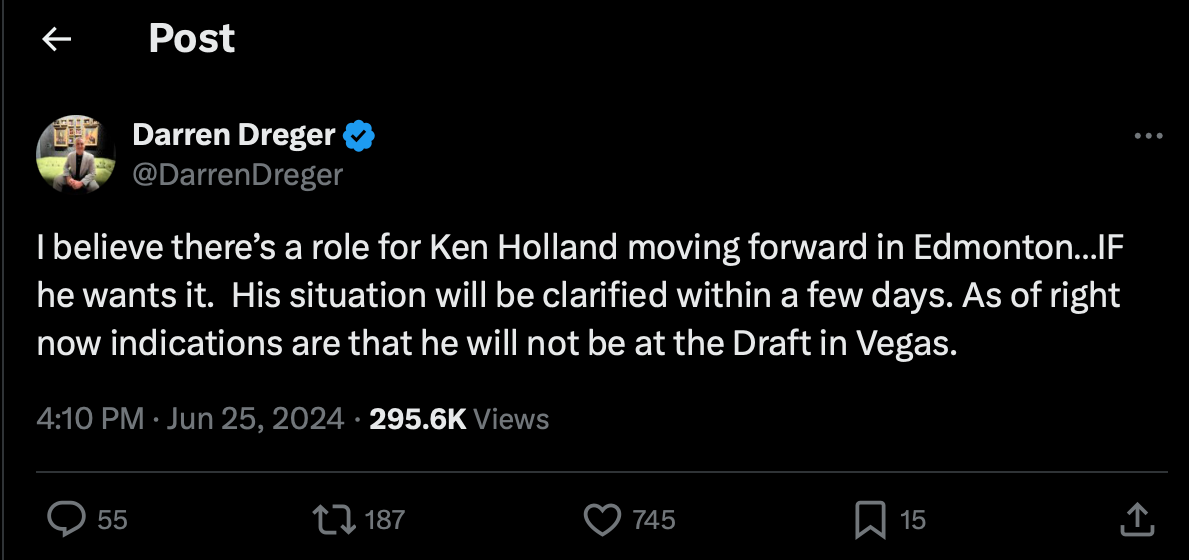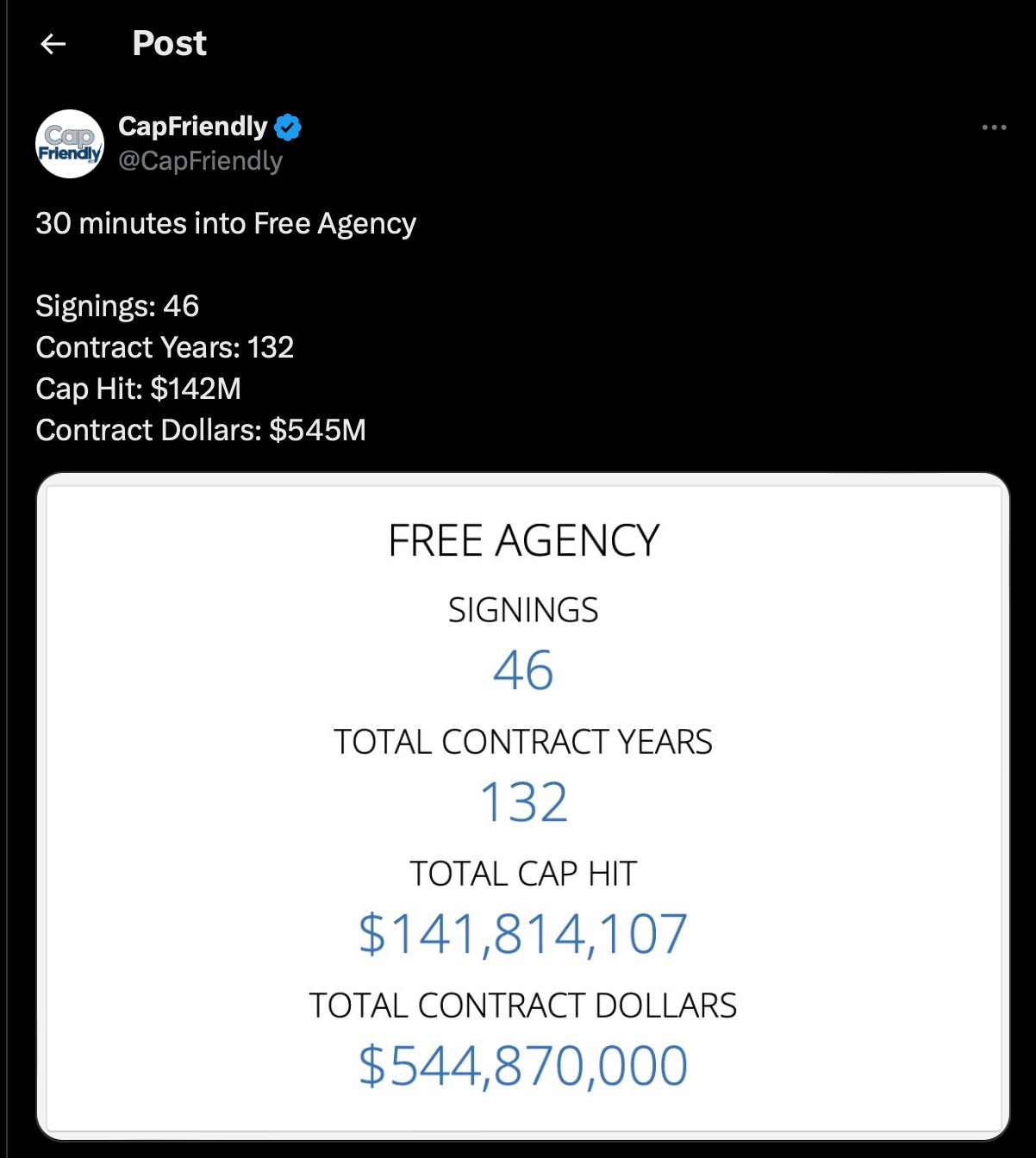Dark Side
Meira Waldstreicher
The two main fields popular to pursue in sports are either the front office or joining the players’ side, most likely becoming a player agent. A common assumption is that these two worlds can’t mix. Front office members, specifically general managers (GMs), focus on what is best for the team, managing players and trades with the team’s interests at heart, devoid of emotion—it’s strictly business. On the other hand, the best agents build personal connections with their clients, acting as advisors and advocates who stand by their players through thick and thin.
The age-old question persists: can these roles mix? Can an experienced agent, whose priority is their players’ welfare, transition to the “dark side” and join front office?
Currently, there are three GMs in the NHL who are former agents. The most recent Stanley Cup Champion’s GM, Bill Zito, began as agent through Acme World Sports, the sports agency he founded with Markus Lehto. Zito’s clients included Tim Thomas, Tuuka Rask, Antti Niemi, and other notable names. In August of 2013, Zito transitioned to the management side with the Columbus Blue Jackets. He was promoted to GM of CBJ’s affiliate team, the Cleveland Monsters, two years later. Just a couple of months before Zito was hired by the Florida Panthers for the GM position, Wasserman, one of the most reputable sports agencies for hockey, acquired Acme World Sports. Zito moved on, and Florida became a hotspot destination for free agents and players seeking trades who had leverage due to their contract stipulations (No-Move Clause, No-Trade Clause). On the surface, Sunrise Florida should be a popular place to play in the NHL because of the weather, beaches, and no state tax. However, the appeal of becoming a Panther may also be attributed to the environment and the people who work there. The culture Zito created contributed to this appeal. Despite the roster turnover since Tito was hired—only four players who have been with him since the start of his tenure (Aleksander Barkov, Aaron Ekblad, Sergei Bobrovsky, and Eetu Luostarinen)—players under Zito have publicly spoken about their positive relationships with him. While sports often forgive or overlook past transgressions due to the athlete’s talent, Zito was committed to finding good, well-grounded, down to earth people to make-up his team. Maybe here’s where the agent mentality still lingers. An agent wants to represent a player they believe in, someone they will support through good times and bad because their client is a quality person. There is mutual respect that is built in that relationship. Zito took a similar approach in building the Stanley Cup-winning team.
In the company that acquired Acme World Sports, Wasserman, a familiar face was the executive vice president of hockey: Jeff Jackson, he current interim GM of the Edmonton Oilers. Jackson played 8 years in the NHL for the Leafs, Rangers, Nordiques, and Blackhawks in the 1980s and early 1990s. Following retirement, he was hired by the Leafs in 2006, and assumed the role of Assistant General Manager (AGM) and Director of Hockey Operations. He also took on the responsibility of GM and Governor of Toronto’s affiliate, the Marlies. Parting with the Leafs in 2010, he pursued player representation. Sam Gagner was his first NHL client with Orr Hockey Group LLP, which Wasserman purchased a stake in 2018. Jackson played a crucial role in transforming Wasserman Hockey into a prominent and respected agency within the hockey industry, representing high profile players such as Connor McDavid, Aaron Ekblad, Evan Bouchard, Roman Josi, and others. While Orr still remains a respected agency, representing players such as Charlie McAvoy and John Carlson, Jackson moved up in the ranks at Wasserman, earning the role of executive vice president of hockey. He continued to strengthen his bond with his Oiler clients, which led to the opportunity to re-enter an NHL organization. In August of 2023, the Oilers hired Jackson as their CEO of hockey operations. He worked closely with GM Ken Holland and Paul Coffey to build the team that the went to the reach Game 7 of the Stanley Cup Finals this season. As the playoffs unfolded and the Oilers were advancing, questions surrounding Ken Holland’s future with the organization began to surface. Just a few days before the draft, hockey insiders uncovered that Holland would not be attending the 2024 NHL Draft in Vegas, shortly leading to the announcement that he would not be re-signing with the team.
So, who stepped up at the Edmonton draft table? None other than Jeff Jackson. Objectively, it’s daunting for a new GM to jump right into the mix for the most important, action-packed days of the year, but Jackson took it in stride. He did not hesitate to be aggressive in trading a first-round pick in 2025 or 2026 to the Flyers in exchange for their 32nd pick (ironically originally owned by the Florida Panthers), to select Sam O’Reilly. Jackson clearly trusted his instincts here and went after the player he believes would impact his organization. At 11:00 AM EST on July 1st, NHL free agency began with a bang. Within a half hour, there were 46 contract signings. Each front-office had to work fast, and if they were not effective with their time and calls, they would quickly fall behind.
While some teams lost core pieces (e.g., Florida Panthers), Jackson was able to keep the Oilers largely intact. He re-signed Adam Henrique, Mattias Janmark, Connor Brown, Josh Brown, and Corey Perry, and added Jeff Skinner and Viktor Arvidsson. The Oilers also traded for promising Sabres prospect Matt Savoie on July 5. So far, Jackson has had a productive offseason. However, the true judgement on Jackson is yet to come, as undoubtedly there will be plenty of hockey fans and media who criticize and praise his upcoming pressing assignment in signing Leon Draisaitl to a contract extension, who will definitely be earning a raise. Now, the search for a permanent GM is underway, which Jackson is leading, and it seems there will be hire shortly. But, I wish Jackson would reconsider putting himself into the mix. Thus far, he has done an excellent job and he might be the answer himself. He had a knack for being an agent, and he could be a great asset in the GM position.
Hopping on a four-hour plane trip east to Montreal, GM Kent Hughes entered the agent business in 1983, creating his own agency, MFive Sports, with partner Anton Thun. For thirty years, they strengthened their client base, representing highly-touted players. After 33 years, MFive Sports merged with Quartexx Management, creating a powerhouse of a hockey agency. In January 2022, with Jeff Gorton, the Executive Vice President of Hockey Operations, on the hunt for a bilingual GM, he hired Hughes. At the time of the hire, the Habs were sitting in last place in league’s standings with a record of 7-25-5 after their Cinderella run to the Stanley Cup Finals the year prior. In February, the Canadians replaced head coach Dominque Ducharme with Martin St. Louis. The Canadiens solidified themselves as sellers ahead of the trade deadline, as Hughes sent valuable players Tyler Toffoli, Ben Chiarot, Arturri Lehkonen, Brett Kulak, and Andrew Hammond, among others, on their way. He was not hesitant to trade players away at the most overwhelming time of the year, which he understood from his background in player representation and knowing how to treat the players that are out the door. The Habs continued to disappoint, securing the first overall pick in the draft. This draft was tricky, as their didn’t appear to be definitive first overall pick. Hughes ultimately selected Juraj Slafkovsky at No. 1 and his Slovak buddy Filip Mešár at No. 26 in the first round. Slafkovsky just earned himself a contract, signing an eight-year, $60.8 million contract extension on July 1st. Since that first draft, Hughes has made some well-researched draft selections, and while it remains to be seen whether they will pan out, he is planning for the future. He has a vision to make this team sustainably successful.
It’s important not to overlook the nepotism aspect here. GMs love their familiar faces and bringing them in to their current organizations. It’s naive to think that just because these GMs did not follow the traditional path, they would not buy in to this as well. In fact, these former agent should probably be more likely to make these moves because after they had close bonds with their clients.
Regardless, here’s the bottom line: switching roles should not be frowned upon. Although being a GM and agent typically represent opposite sides in negotiations, they must collaborate closely to achieve their respective goals. Each party inevitably prioritizes its one interests, but the experience gained from operating on both sides can significantly help the negotiation process. The unique dual perspective creates a level of empathy that most GMs lack. A GM with experience as an agent understands the motivations and strategies behind the agent’s actions, even when they seem frustrating. As this trend begins to bubble, the NHL may see more former agents stepping into front-office positions, bringing a fresh and valuable approach to team management.



